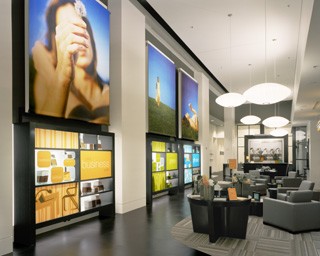I wish my bank served chocolate coins on a silver platter. In fact, I wish everyone served me chocolate. Unfortunately, only a handful of businesses appear to comprehend this point. Ritz-Carlton, for example. And Roseburg, Oregon-based Umpqua Bank.
Umpqua has mastered the art of effective lifestyle retailing. It banks on pampered customers to differentiate itself from more standard, stress-inducing bank environments. The bank, which was founded in 1953, identified its core service strategy in 1994. Since then, its has gained more than $6.8 billion in assets. It also landed at 13th place on the 2008 Fortune 100 Best Companies to Work For.
Remember Starbucks’ move to sell music CDs in their coffee shops? Umpqua sells music, too—in a different guise. The bank has its own Discover Local Music Program, which highlights up-and-coming artists in the bank’s operating regions (mainly the Pacific Northwest). It also offers free Wi-Fi, its own brand of specialty coffee, and space for community events like movie nights and yoga classes.
Customers, in effect, hang while they bank. The idea is to walk in, gaze at interactive digital signage, sip free brew, lounge in the comfortable seating area—and stick around long enough to do some banking on the side.
“We eliminate the chore from banking,” says Lani Hayward, Umpqua’s Executive Vice President of Creative Strategies. “The retail model gives people a reason to come in to the bank. Our customers and other community members use our stores as community centers. Many come for entertainment and or just to read the paper and enjoy a cup of coffee.” She adds that when people come in to the stores, they are also more likely to do business with Umpqua or make an impulse buy.
Though the bank isn’t immune to the subprime scourge, its strength in the community promises to sustain it. Business Pundit interviewed Hayward for specifics on Umpqua’s customer-centric model:
Q: What are the three biggest things that make you completely different from other banks?
Umpqua’s key differentiator is our culture. Our associates are our most valuable asset and when hired, take a full day to learn about the Umpqua culture. Some additional elements that make our culture vibrant include a daily inspiration every morning, 40 hours of paid time off each year for associates to volunteer in the community, and giving associates the ability to make the final call on customer service decisions—no need to ask a manager.
We’re really in the retail industry. We aim to offer a welcoming environment where our customers can browse, shop, relax and bank. Fresh coffee is always on tap, free Internet access is offered and a chocolate coin is served on a silver platter after every transaction. Customers can catch a Business Therapy session or join neighbors for movie night.
We also eliminate the chore from banking. Unlike most banks, where customers have to wait in roped-off lines to get to someone who can handle their specific banking needs, all of Umpqua’s Universal Associates are trained to handle each customer’s banking needs. As a result of this model, we have low employee turnover, high customer loyalty, and two times the average products per household.
Q: Which of your sectors brings in the most growth in today’s economy?
More than half of our growth is from small to medium sized businesses. Growth for most banks has slowed during the past 12 months, but due to Umpqua’s quick response to the changing economy, we have been able to maintain steady deposit growth and mitigate the pitfalls many banks have experienced on the commercial side.
Q: Along with being a bank, you’re known as a lifestyle retailer. Do you think this idea is still sellable in a recessionary economy, where people are less likely to buy products? If so, why?
Absolutely! When Ray Davis came to Umpqua in 1994 he immediately identified that we are in the retail business, selling financial services and products. That philosophy has not changed. For Umpqua, operating as a store, or retailer, is about more than buying products – it’s about lifestyle and staying ahead of customer preferences. As the Boomer generation have already demonstrated, the status quo is no longer acceptable.
The retail model gives people a reason to come in to the bank. This is particularly important now as foot traffic across the industry is down. When people come in to the stores, they experience our culture and are more likely to do business with us or make an “impulse buy.”
Our customers and other community members use our stores as community centers. Many come for entertainment and or just to read the paper and enjoy a cup of coffee. These types of community interactions demonstrate that Umpqua is more than a just a bank.
Q: Where do you see the most growth in the next 5 years?
We believe the strongest growth will continue to be with small to medium sized companies and among the 45- to 65-year-old demographic. In terms of channels for growth, the store network will continue to play an extremely important role while at the same time more remote capabilities will be added including improved cash management systems to direct bank activities that expand our footprint.
(I believe that last sentence, in lay terms, means Umpqua plans to add cool features to its banking technology in order to draw in new customers.)
Giving customers love is smart, especially when a bad economy shocks people out of consume mode. I personally am unfamiliar with the concept of hanging out at a bank. But I’m not averse to it, especially if they don’t kick me out for chugging serial cups of gourmet coffee and spending hours on free Wi-Fi.
So, WaMu. Where’s my gold chocolate coin?
Lani Hayward is Umpqua’s EVP of Creative Strategies. Find out more at Umpqua’s website (NASDAQ: UMPQ).
This interview is part of a series Business Pundit is doing with Fortune 100 companies. If you have any tips, please email businesspundit.tips@gmail.com.


